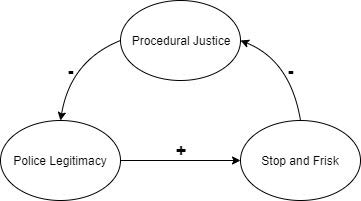Understanding the Bounds of Legitimacy: Weber’s Facets of Legitimacy and the Police Empowerment Hypothesis
Abstract
Despite considerable evidence that police legitimacy results in beneficial outcomes like compliance, cooperation, and empowerment, scholars have yet to agree on how to define and operationalize legitimacy. Drawing on Max Weber’s facets of legitimacy, we developed and tested a measure of traditional authority, reflecting the possibility that some people legitimate the police more so based on tradition than normative concerns regarding fairness. Confirmatory factor analysis of survey data from a national sample of 701 US adults revealed that our traditional authority items loaded separately from items commonly used to capture feelings of trust, obligation to obey, and moral alignment. Furthermore, although perceived legitimacy appears to flow from perceptions of procedural and distributive fairness regardless of how it is measured, traditional authority is more strongly associated with empowerment of the police. We discuss the theoretical and practical implications of these findings and urge researchers to replicate and extend our work.
Kyle McLean and I have a new paper forthcoming in Justice Quarterly where we revisit Max Weber’s work on “legitimacy.” He argued people can legitimate authorities in three ways:
- Rational Legitimacy - where legitimacy primarily stems from the perceived procedural fairness of authorities (think Tom Tyler’s work).
- Charismatic Legitimacy - where legitimacy is based on an the appeal of an authority’s personality
- Traditional Legitimacy - where legitimacy rests “on an established belief in the sanctity of immemorial traditions and the legitimacy of the status of those exercising authority under them” (Weber, 1947:328)
We hypothesized that some people legitimate the police more through traditional means than what Weber called rational means. This matters because when people view policing as legitimate, they are more likely to comply with the law, cooperate with police (e.g., report crimes), and empower the police to do what they think is necessary to suppress crime.
But consider practices like stop, question and frisk (SQF). The empowerment hypothesis suggests that greater legitimacy should grant officers greater discretion in using SQF. However, many citizens believe SQF is used in an arbitrary and discriminatory manner. To the extent that individuals believe that SQF is discriminatory, procedural justice theory suggests that its use will decrease police legitimacy. In other words, a feedback loop is generated where greater perceptions of legitimacy lead to an increase in empowerment to SQF, but its increased usage leads to negative perceptions of procedural justice and a decrease in legitimacy.

So the empowerment hypothesis provides an opportunity to examine why acknowledging various “facets” of legitimacy is so crucial. More than developing a clearer understanding of the theoretical underpinnings of legitimacy, the type of legitimacy granted may be directly related to the relationships legitimacy has with important (and more tangible) outcomes.
To test our hypotheses, we surveyed a national sample of 701 US adults. We found that:
- Items we developed to measure traditional legitimacy1 loaded separately from items commonly used to measure trust in police, obligation to obey police, and perceived moral alignment with police.
- Procedural and distributive justice were positively associated with legitimacy, regardless of how it was measured.
- Traditional legitimacy was more strongly associated with both global and situational empowerment of the police. In other words, those who scored higher on our traditional legitimacy scale were more likely to agree that, e.g., the police “should have the power to do whatever they think is necessary to fight crime” and that police departments should be allowed to investigate their own officers when they are involved in a shooting.
Click on the PDF button at the top of the page to download the full text. Feedback is always welcome!
- “I tend to give police officers the benefit of the doubt during controversial situations,” “It is difficult to imagine a situation where I would not support the actions of a police officer,” and “In general, I believe the statements of police officers more than the statements of suspects.” ^
